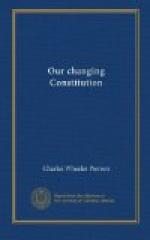The United States Constitution as originally adopted did not prescribe who should be entitled to vote. That matter was left entirely in the hands of the states. The Constitution provided[1] that, for the election of members of the House of Representatives, “the electors in each state shall have the qualifications requisite for electors of the most numerous branch of the state legislature.” It was further provided that Senators should be chosen by the legislatures of the states[2] and that the President and Vice-president should be chosen by presidential electors appointed in such manner as the state legislatures might direct.[3] These were the only elective federal officials.
[Footnote 1: Article I, Section 2.]
[Footnote 2: Article I, Section 3.]
[Footnote 3: Article II, Section 1.]
While the states were thus left in full control, it does not follow that the matter was deemed wholly outside the proper scope of national authority. No argument is necessary to demonstrate that the regulation of the suffrage in national elections is or may be a matter of national concern. The question of prescribing the qualifications of voters in such elections was much debated in the Convention which framed the Constitution.[1] Some members were in favor of prescribing a property qualification and limiting the suffrage to freeholders. It was finally decided, however, to accept the qualifications prescribed by state law. In adopting this plan the Convention followed the line of least resistance. The qualifications of voters in the various states differed.[2] Most states required a property qualification, but some did not. It was felt that to attempt to impose a uniform rule on all the states would arouse opposition and create one more obstacle to be overcome in the formidable task of getting the Constitution ratified.
[Footnote 1: See e.g., Farrand, “Records of the Federal Convention,” Vol. II, p. 201 et seq.]
[Footnote 2: For a statement of the qualifications in the various states see Minor v. Happersett, 21 Wall., 162.]
There the matter rested, with suffrage qualifications regulated entirely by state law, until after the Civil War. Meanwhile, the states had been abolishing property tests, and universal male suffrage had been written into state constitutions. The cry for woman suffrage had begun, but as yet it was only a still small voice, inaudible to legislators.
After the Civil War the problem of protecting the emancipated slaves had to be dealt with, and three constitutional amendments (Nos. XIII, XIV, and XV) were adopted with that end primarily in view. Number XIII, ratified in 1865, formally abolished slavery. Number XIV, ratified in 1868, extended citizenship to all persons born in the United States and provided (among other things) that no state should abridge the privileges or immunities of citizens of the United States. Number XV, ratified in 1870,




